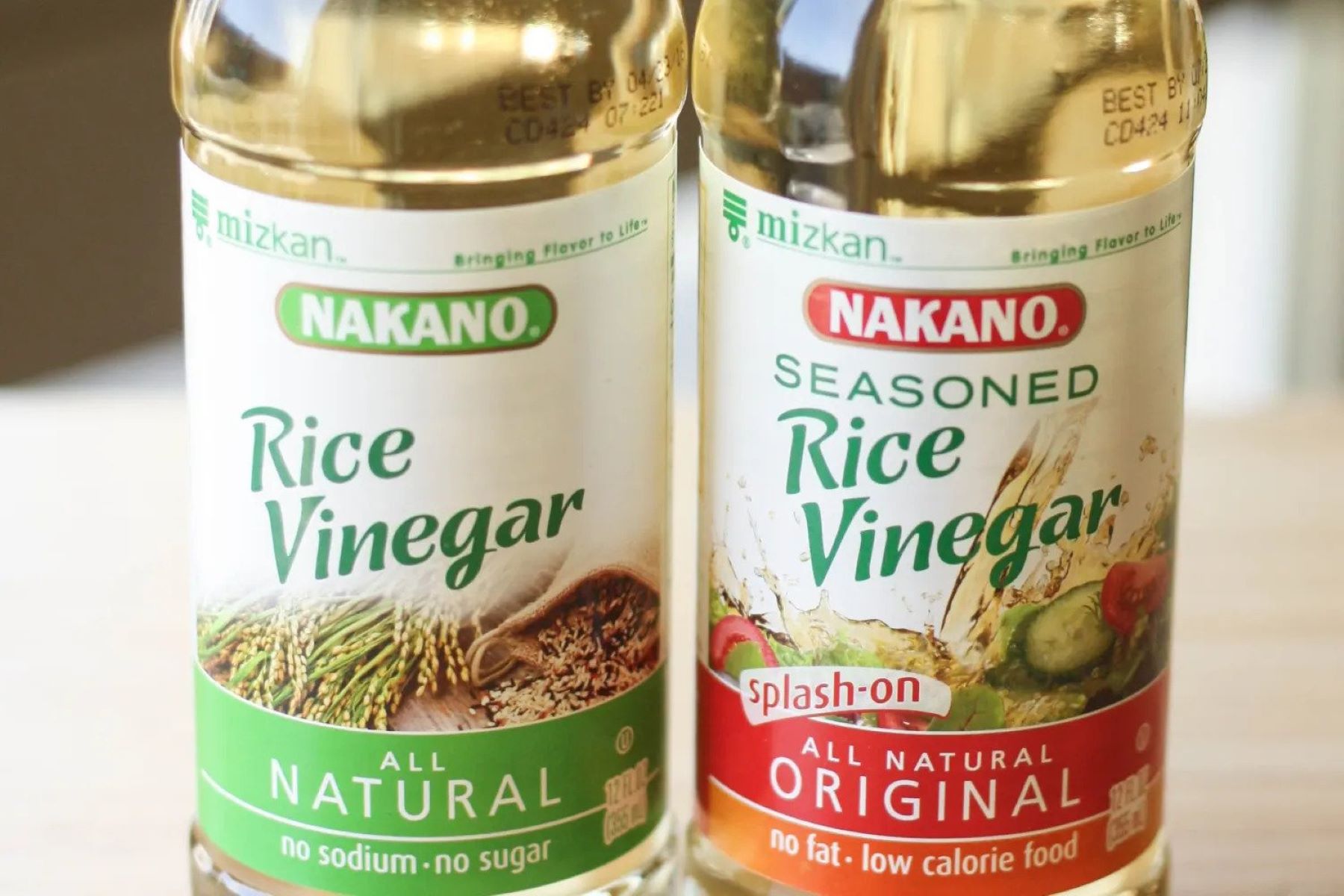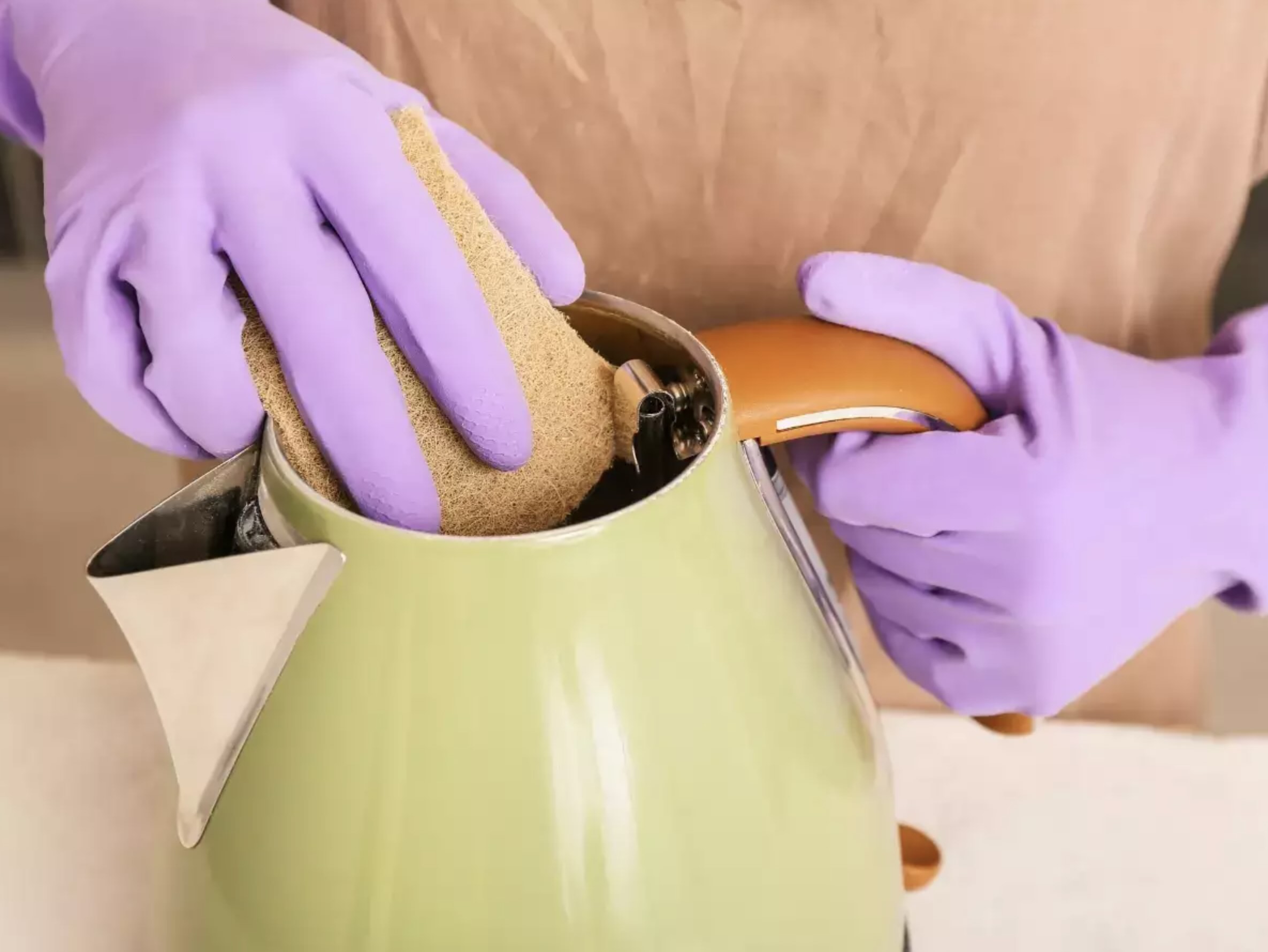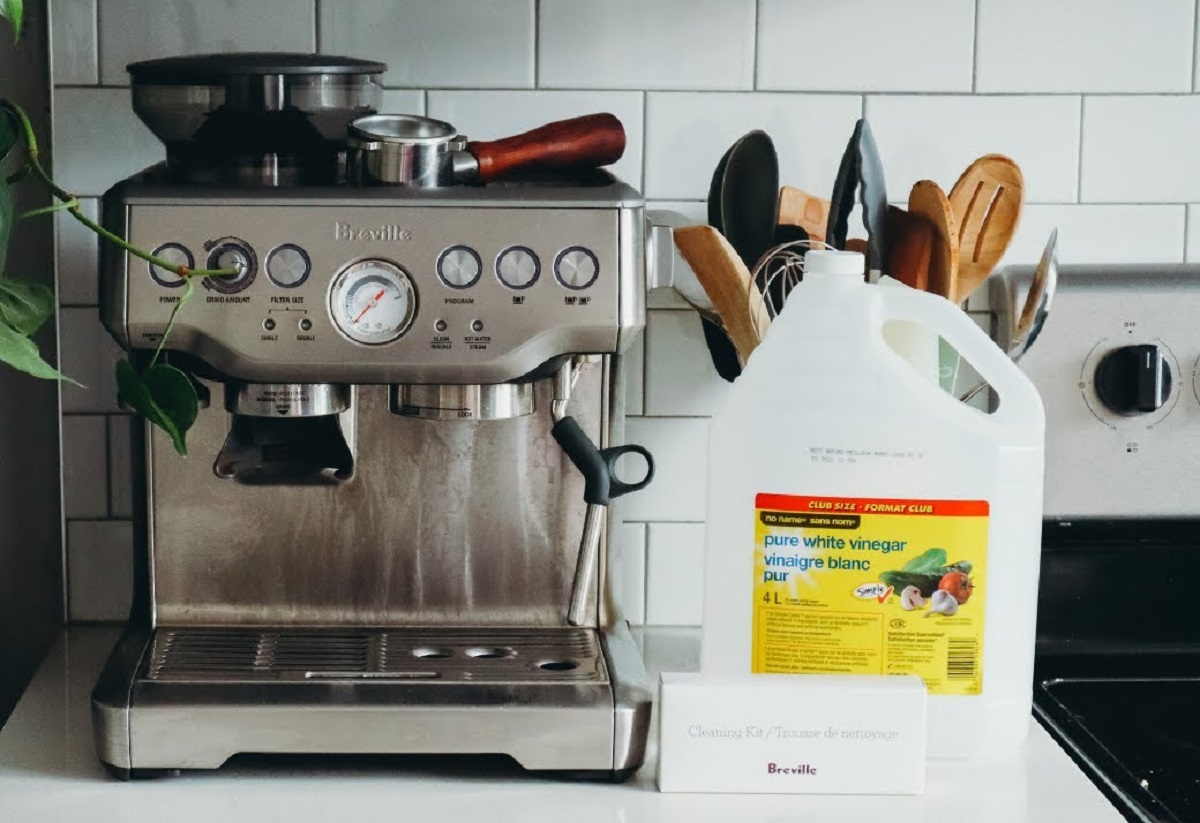

Articles
How To Store Rice Vinegar
Modified: December 7, 2023
Learn the best methods for storing rice vinegar and keeping it fresh for longer. Read our informative articles and tips today!
(Many of the links in this article redirect to a specific reviewed product. Your purchase of these products through affiliate links helps to generate commission for Storables.com, at no extra cost. Learn more)
Introduction
Rice vinegar is a popular ingredient in many Asian cuisines, known for its unique flavor and versatile uses. Made from fermented rice, rice vinegar adds a tangy and subtly sweet taste to dishes, making it a staple in salad dressings, marinades, and various recipes.
While rice vinegar offers a delightful taste and aroma, it is essential to store it properly to maintain its quality and prolong its shelf life. Improper storage can lead to a loss of flavor, contamination, and even spoilage. In this article, we will explore the importance of storing rice vinegar correctly and provide you with valuable tips to ensure its freshness and longevity.
Key Takeaways:
- Proper storage of rice vinegar is crucial to maintain its flavor, aroma, and quality. Choosing the right container, avoiding heat and light, and sealing it tightly are key to preserving its freshness and enhancing culinary experiences.
- By following best practices for storing rice vinegar, you can prolong its shelf life and ensure its delightful taste. Keep it away from heat and light, seal the container tightly, and monitor for spoilage to enjoy its versatile uses in various recipes.
Read more: How To Store Jalapeños In Vinegar
Importance of Proper Storage
Proper storage of rice vinegar is essential to maintain its taste, aroma, and nutritional value. Storing it incorrectly can lead to deterioration and spoilage, affecting the quality of your dishes. Some of the reasons why proper storage is crucial include:
- Preserving flavor: Exposure to air, heat, and light can cause the flavor of rice vinegar to deteriorate over time. Proper storage helps to retain its distinct taste and aroma, ensuring the best culinary experience.
- Preventing contamination: Rice vinegar is susceptible to contamination by bacteria and other microorganisms. By storing it properly, you can reduce the risk of bacterial growth and maintain its cleanliness.
- Prolonging shelf life: Storing rice vinegar correctly can help extend its shelf life, allowing you to enjoy its flavors and benefits for a longer period.
Choosing the Right Container
The choice of container plays a crucial role in ensuring the proper storage of rice vinegar. It is recommended to use a glass or plastic container that is specifically designed for food storage, as these materials are less likely to react with the vinegar and alter its taste. Make sure the container has a tight-fitting lid to prevent air from entering and contaminating the vinegar.
Additionally, it is advisable to use a container with a dark color or one that is opaque to protect the vinegar from light exposure. Light can cause the breakdown of certain compounds in the vinegar, resulting in a loss of flavor and quality.
…
Continue the article with other sections and details.
Key Takeaways:
- Proper storage of rice vinegar is crucial to maintain its flavor, aroma, and quality. Choosing the right container, avoiding heat and light, and sealing it tightly are key to preserving its freshness and enhancing culinary experiences.
- By following best practices for storing rice vinegar, you can prolong its shelf life and ensure its delightful taste. Keep it away from heat and light, seal the container tightly, and monitor for spoilage to enjoy its versatile uses in various recipes.
Read more: How To Store Jalapeños In Vinegar
Importance of Proper Storage
Proper storage of rice vinegar is essential to maintain its taste, aroma, and nutritional value. Storing it incorrectly can lead to deterioration and spoilage, affecting the quality of your dishes. Some of the reasons why proper storage is crucial include:
- Preserving flavor: Exposure to air, heat, and light can cause the flavor of rice vinegar to deteriorate over time. Oxidation, which occurs when vinegar comes into contact with air, can lead to a loss of flavor and a less vibrant taste. Proper storage helps to retain its distinct taste and aroma, ensuring the best culinary experience.
- Preventing contamination: Rice vinegar, like any other food product, is susceptible to contamination by bacteria and other microorganisms. Improper storage conditions can create an environment for the growth of harmful bacteria, leading to foodborne illnesses. By storing rice vinegar properly, you can reduce the risk of bacterial growth and maintain its cleanliness.
- Prolonging shelf life: Storing rice vinegar correctly can help extend its shelf life, ensuring that it remains fresh and usable for an extended period. This is particularly important if you use rice vinegar occasionally or if you purchase it in larger quantities. Proper storage can slow down the process of vinegar degradation and preserve its quality over time.
By understanding the importance of proper storage, you can ensure that your rice vinegar remains flavorful, safe, and suitable for consumption. The following sections will guide you on how to store rice vinegar correctly to maximize its freshness:
Choosing the Right Container
The choice of container plays a crucial role in ensuring the proper storage of rice vinegar. It is recommended to use a glass or plastic container that is specifically designed for food storage, as these materials are less likely to react with the vinegar and alter its taste. Avoid containers made of materials that can leach chemicals or flavors into the vinegar, such as metal or reactive plastics.
Make sure the container you choose has a tight-fitting lid to prevent air from entering and contaminating the vinegar. Oxygen exposure can lead to quality degradation and loss of flavor. An airtight seal helps to maintain the vinegar’s integrity and freshness.
Consider using a container with a dark color or one that is opaque to protect the vinegar from light exposure. Light, especially UV light, can cause the breakdown of certain compounds in the vinegar, resulting in a loss of flavor and quality. Choosing an opaque container can prevent light from reaching the vinegar and help preserve its taste and aroma.
…
Continue the article with additional sections and details.
Choosing the Right Container
When it comes to storing rice vinegar, the choice of container is crucial to maintain its quality and ensure its longevity. Here are some key factors to consider when selecting the right container:
Material:
Opt for glass or food-grade plastic containers when storing rice vinegar. These materials are non-reactive and won’t affect the taste or quality of the vinegar. Avoid using containers made of metal or reactive plastics as they can leach chemicals into the vinegar, altering its flavor.
Lid:
Make sure the container has a tight-fitting lid. A secure seal will prevent air from entering the container and causing oxidation, which can lead to a loss of flavor. Look for containers with sealing mechanisms such as screw-on lids or snap-lock lids.
Opaque or Dark-colored:
Consider using an opaque or dark-colored container to protect the rice vinegar from light exposure. Light, particularly UV light, can lead to the breakdown of certain compounds in the vinegar, resulting in a loss of flavor and quality. By using an opaque container, you can shield the vinegar from light and maintain its taste and aroma.
Read more: How To Store Apple Cider Vinegar
Size:
Choose a container that is an appropriate size for your needs. It’s best to store rice vinegar in a container that is not too large relative to the amount of vinegar you have. A smaller container reduces the air space inside, minimizing the vinegar’s exposure to oxygen that can degrade its quality.
Additional Considerations:
If possible, look for containers with a pour spout or a narrow neck. This design feature helps control the amount of vinegar poured, reducing the risk of spills or excessive exposure to air during usage. Additionally, consider the container’s shape and ensure it is easy to handle and store in your kitchen.
By choosing the right container for your rice vinegar, you can ensure that it remains fresh, flavorful, and suitable for use in your culinary creations.
…
Continue the article with additional sections and details.
Keeping Away from Heat and Light
Proper storage of rice vinegar involves protecting it from harmful elements such as heat and light. Both heat and light can accelerate the deterioration process, leading to a loss of flavor and quality. Here are some important considerations to keep in mind:
Avoid exposure to heat:
Rice vinegar should be stored away from direct heat sources, such as stoves, ovens, or heating vents. Heat can cause the vinegar to break down more rapidly, affecting its taste and aroma. To prevent heat exposure, choose a storage location that is cool and away from any potential sources of heat in your kitchen.
Read more: How To Store Red Wine Vinegar
Protect from sunlight:
Direct sunlight can be equally damaging to rice vinegar. UV rays from the sun can cause the vinegar to degrade and lose its flavor. To protect it, store your vinegar in a dark and cool cupboard or pantry. If your storage area allows sunlight to enter, consider using an opaque or tinted container to shield the vinegar from harmful light.
Store in a cool environment:
Storing rice vinegar at room temperature is generally adequate, but it’s important to ensure that the temperature remains stable. Avoid storing the vinegar in areas that may experience temperature fluctuations, such as near a hot stove or a refrigerator. Extreme temperature changes can affect the vinegar’s quality and may lead to spoilage.
Avoid storing in the refrigerator:
Rice vinegar can be stored at room temperature with no need for refrigeration. Refrigeration is not required and can actually affect the vinegar’s quality. The cold temperatures can cause the vinegar to become cloudy or develop sediment, affecting its appearance and potentially altering the taste.
By keeping rice vinegar away from heat and light and storing it in a cool and controlled environment, you can help to preserve its flavor, aroma, and quality for a longer period.
…
Continue the article with additional sections and details.
Seal the Container Tightly
One crucial aspect of proper rice vinegar storage is ensuring that the container is tightly sealed. A secure seal helps to maintain the vinegar’s freshness, prevent air exposure, and reduce the risk of contamination. Here are some important points to consider:
Read more: How To Store Balsamic Vinegar Once Opened
Choose a container with airtight properties:
When selecting a container for rice vinegar, opt for one with a lid that provides an airtight seal. This ensures that minimal air enters the container, preventing oxidation and maintaining the vinegar’s flavor and quality. Containers with screw-on lids or snap-lock lids are generally effective in achieving a tight seal.
Check for proper closure:
Ensure that the container’s lid fits securely and tightly onto the body of the container. This prevents any gaps or openings that could allow air or contaminants to enter. Give the lid a gentle shake or apply slight pressure to ensure a proper closure and to verify that the lid remains securely in place.
Avoid partially filled containers:
Using a container that is appropriately sized for the amount of rice vinegar you have is important for maintaining proper seal integrity. Containers that are too large in relation to the vinegar volume may create excess air space, which can lead to oxidation. If you have an almost empty container, consider transferring the vinegar into a smaller container to minimize air exposure.
Store the container upright:
Storing the container upright can help maintain a tight seal. This position reduces the likelihood of accidental spills and leakage that could compromise the vinegar’s quality. Additionally, storing the container upright can minimize the risk of air entering the container when opening and closing it.
By making sure that the container is tightly sealed, you can preserve the freshness and quality of the rice vinegar, ensuring its optimal flavor when used in your favorite recipes.
…
Continue the article with additional sections and details.
Store in a Cool and Dry Place
Proper storage of rice vinegar involves choosing the right environment to maintain its quality and extend its shelf life. Storing rice vinegar in a cool and dry place helps to prevent the growth of bacteria, maintain flavor, and preserve its integrity. Here are some key points to consider:
Avoid high humidity:
Exposure to humidity can cause rice vinegar to spoil faster and affect its taste. Moisture can create an ideal breeding ground for bacteria and other microorganisms. Therefore, it is essential to store rice vinegar in a dry environment. Avoid storing it in areas like near the sink, dishwasher, or any place prone to water or dampness.
Avoid extreme temperature changes:
Fluctuating temperatures can impact the quality and stability of rice vinegar. Avoid storing it near heat sources like stovetops, ovens, or appliances that generate heat. Rapid temperature changes can cause the vinegar to degrade more quickly and affect its flavor. Optimum storage temperature for rice vinegar is generally around 53°F to 77°F (12°C to 25°C).
Choose a suitable storage spot:
Find a cool, dark, and dry place to store your rice vinegar. A cupboard or pantry away from sunlight and heat sources is ideal. Keep it away from spices, strong-smelling substances, or anything that could potentially affect the flavor of the vinegar. Additionally, ensure that the storage spot is well-ventilated to prevent any lingering odors from being absorbed.
Read more: How To Clean The Dishwasher With Vinegar
Avoid storing near strong odors:
Rice vinegar can be sensitive to absorbing strong odors from its surroundings. It’s best to store it separately from pungent ingredients or strong-smelling items to maintain its distinct flavor. This will help ensure that the vinegar retains its original taste without any external influences.
Check the expiration date:
While properly stored rice vinegar can have a long shelf life, it’s important to check the expiration date on the bottle or packaging. Even though rice vinegar may not spoil after the expiration date, its quality and flavor may gradually decline. Using vinegar past its expiration date may result in less desirable taste and aroma.
By storing your rice vinegar in a cool and dry place, you can preserve its flavor, freshness, and nutritional value, ensuring that it remains a delicious ingredient in your culinary endeavors for an extended period of time.
…
Continue the article with additional sections and details.
Checking for Spoilage
Regularly checking rice vinegar for signs of spoilage is essential to ensure that it remains safe and of good quality for consumption. Although rice vinegar is known for its long shelf life, it can still deteriorate over time or become contaminated. Here are some indicators to look out for when checking for spoilage:
Examine the appearance:
Visually inspect the rice vinegar for any changes in color, consistency, or cloudiness. Fresh rice vinegar should have a clear and transparent appearance. If you notice any discoloration, sediment, or cloudiness, it may be a sign of spoilage or bacterial growth. Discard the vinegar if it appears uncharacteristic.
Read more: How To Kill Grass With Vinegar
Sniff for off odors:
Give the rice vinegar a gentle sniff to check for any unusual or unpleasant odors. Fresh rice vinegar should have a mild, slightly acidic aroma. If you detect any foul or rancid smells, it is an indication that the vinegar has gone bad. Trust your sense of smell and discard the vinegar if it doesn’t smell right.
Taste for quality:
While rice vinegar is known for its tangy and slightly sweet flavor, a change in taste can suggest spoilage. Take a small sip and assess the taste. If you notice any off flavors, bitterness, or an overly acidic taste, it’s best to discard the vinegar as it may no longer be suitable for culinary use.
Check for mold or growth:
Inspect the container of rice vinegar for any signs of mold growth or unusual formations. Mold is a clear indication of spoilage and should not be consumed. Similarly, any visible signs of bacterial growth, such as bubbles, slimy residue, or floating debris, indicate contamination and render the vinegar unsafe to use.
It’s important to note that rice vinegar can have sediment or small particles float in it, which is natural and doesn’t necessarily indicate spoilage. However, if the sediment appears excessive or unusual, it’s best to exercise caution and consider discarding the vinegar.
Regularly checking for signs of spoilage helps ensure that the rice vinegar you use is fresh, safe, and of good quality. If you notice any abnormalities during the inspection, it’s always better to err on the side of caution and replace the vinegar to maintain the integrity of your dishes.
…
Continue the article with additional sections and details.
Tips for Prolonging Shelf Life
To maximize the shelf life of rice vinegar and ensure its long-lasting freshness, consider implementing the following tips:
Read more: How To Clean A Mattress With Vinegar
Keep the lid tightly sealed:
After each use, make sure to secure the lid tightly on the container to prevent air from entering and oxidizing the vinegar. This helps maintain its flavor and quality for an extended period. Avoid leaving the lid partially open or loosely sealed, as this can lead to the growth of bacteria and spoilage.
Store in the refrigerator (optional):
Although rice vinegar does not require refrigeration, storing it in the refrigerator can help prolong its shelf life. If you live in a warm and humid environment or if you anticipate infrequent use of the vinegar, refrigeration can slow down the degradation process and maintain its freshness. However, ensure that the bottle is tightly closed and stored away from strong-smelling foods.
Avoid cross-contamination:
When using rice vinegar, avoid introducing contaminants into the bottle. This can be done by using clean utensils, such as spoons or measuring cups, to retrieve the vinegar. Avoid using your fingers or dirty utensils, as this can introduce bacteria and reduce the vinegar’s shelf life. Additionally, ensure that your hands are clean when handling the bottle.
Use a separate pouring spout:
If your rice vinegar container doesn’t come with a built-in pour spout or if you prefer greater control over the amount poured, consider using a separate pouring spout or dispenser. This can help minimize exposure to air and reduce the risk of spills during usage, thus prolonging the vinegar’s shelf life.
Read more: How To Clean Washer With Vinegar
Avoid direct sun exposure:
Protect rice vinegar from direct sunlight. Exposure to UV rays can degrade the vinegar and impact its flavor and quality. Store the container in a dark cupboard or pantry away from any windows or light sources. Alternatively, opt for an opaque container that blocks out light and preserves the vinegar’s integrity.
Monitor for condensation:
Check the bottle for any signs of condensation or moisture buildup. If you notice condensation on the inside of the container, it may indicate that the vinegar was not properly sealed or that temperature fluctuations have occurred. Wipe away any moisture and ensure the container is tightly sealed to prevent future condensation.
By following these tips, you can ensure that your rice vinegar remains fresh and maintains its flavor for an extended period, allowing you to enjoy its delightful taste in your culinary creations.
…
Continue the article with additional sections and details.
Conclusion
Proper storage of rice vinegar is essential to preserve its taste, aroma, and quality. By following the right practices, you can ensure that your rice vinegar remains fresh, flavorful, and safe to use in your culinary ventures. Here are the key points to remember:
First, choose the right container for storing rice vinegar. Use a glass or plastic container that is designed for food storage, with a tight-fitting lid to prevent air from entering. Opt for a container that is opaque or dark-colored to protect the vinegar from light exposure.
Keep the rice vinegar away from heat and direct sunlight. High heat and UV light can accelerate the deterioration process and affect the vinegar’s flavor and quality. Store it in a cool and dry place, maintaining a stable temperature and avoiding extreme temperature changes.
Ensure that the container is sealed tightly to prevent air and contaminants from entering. This will help maintain the vinegar’s freshness and prevent spoilage. Additionally, periodically check the vinegar for any signs of spoilage, such as changes in appearance, odor, or taste.
Implementing these tips and best practices will help prolong the shelf life of your rice vinegar, ensuring that it remains a flavorful and versatile ingredient in your kitchen. Remember, proper storage and care can make a significant difference in maintaining the vinegar’s integrity and maximizing its usability.
So, the next time you reach for your bottle of rice vinegar, ensure that it is stored correctly to savor its tangy and subtly sweet notes. With good storage practices, you can enhance the flavor of your dishes and elevate your culinary creations with the delightful taste of rice vinegar.
By following these guidelines, you can ensure that your rice vinegar remains fresh and delicious, ready to enhance your meals with its unique flavor profile. Enjoy the many culinary possibilities that rice vinegar brings, knowing that proper storage keeps it at its best.
Happy cooking!
…
End the article
Frequently Asked Questions about How To Store Rice Vinegar
Was this page helpful?
At Storables.com, we guarantee accurate and reliable information. Our content, validated by Expert Board Contributors, is crafted following stringent Editorial Policies. We're committed to providing you with well-researched, expert-backed insights for all your informational needs.







0 thoughts on “How To Store Rice Vinegar”